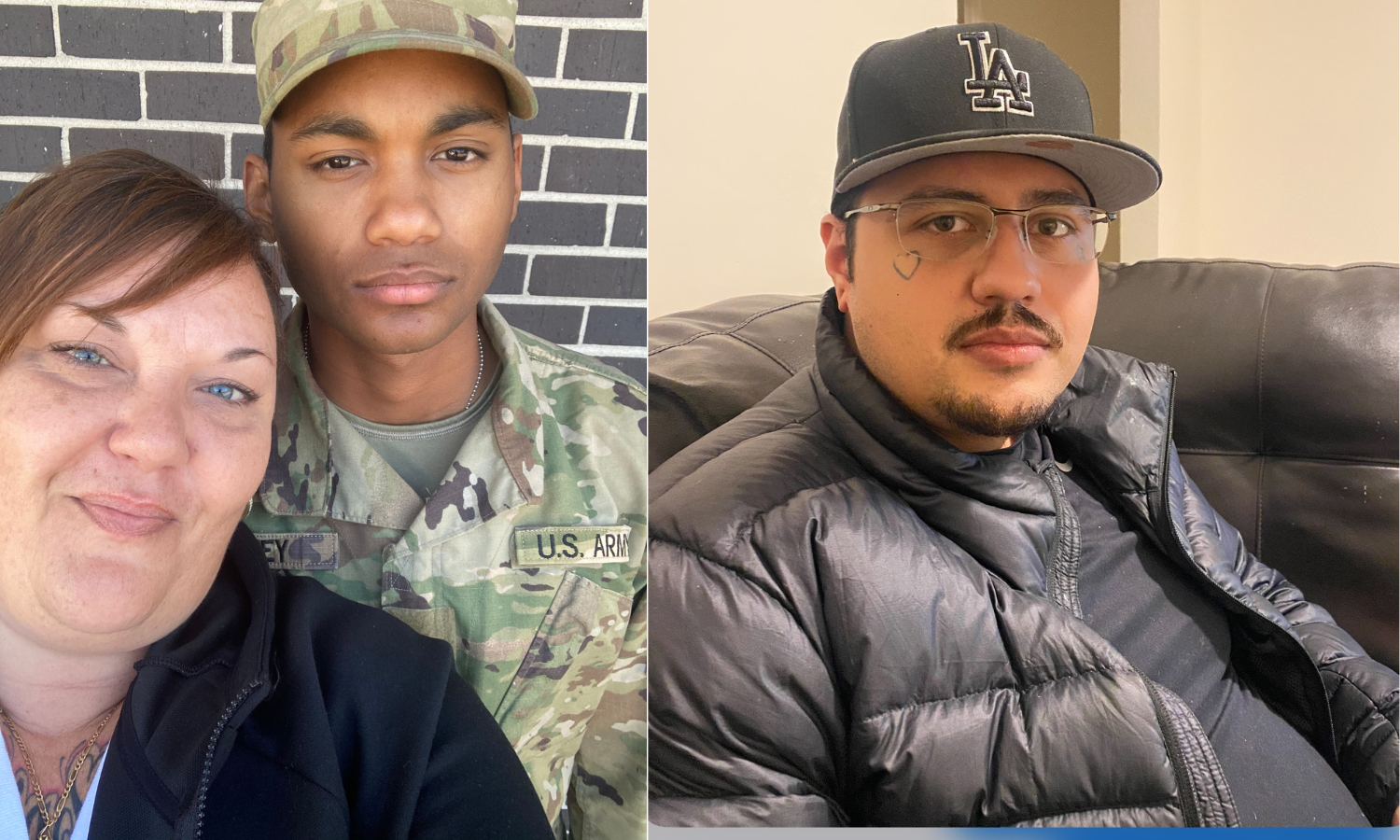We have normalized the killing of people with mental health issues. We don’t think twice about discounting someone’s life because of the way they live, if they used drugs, or drank heavily. We’re okay with making assumptions about someone based on where they live or what they look like. We’ve normalized arresting the homeless and the mentally ill rather than treating them and helping them. We’ve lost our humanity.
9 April 2025, El Paso, Texas, Steven Zimmerman – Are we failing our most vulnerable citizens? Are we weaponizing the El Paso Police Department [EPPD] to address homelessness and mental illness as if it were an enemy invading our country? I’m beginning to think we are.
My last few articles at Southwest News Today have told the stories of Martin Herrera-Garcés and Lary Donnell Lacy. Though separated by circumstances and time, both men have met a similar fate: death.
Read about Martin and Donnell and see prior articles.
Martin Herrera-Garcés
Martin was only twenty-seven years old. His mom and sister said he was a loving, caring man. Darcy Thomas, Martin’s mom, had attempted to reach out to the El Paso Police Department to get help for her son. Martin had been off his medication and was suffering a mental health emergency.
“When he was three years old,” says Darcy, “he [Martin] wouldn’t let me carry things at the store. Anything I picked up, he would say, ‘I take it, I take it,’ that’s who he was.”
Darcy never said that her son was violent or would cause harm to others. Instead, she was compelled to say just that when seeking the Emergency Detention Order for her son.
“My son, Martin, was a gift from God,” says Darcy. “I already had three c-sections, was thirty-five years old, and the doctor told me I couldn’t have any other children.”
“My brother was my best friend and did not deserve this. We loved him so much. May he rest in peace,” says Olivia Armendariz, Martin’s brother. “Our lives will never be the same without him. We won’t rest until justice is served for my brother.
Darcy wanted a son more than anything. She already had three daughters and prayed for a son.
“I took him to WWE when he was about nine,” says Darcy. “He was so excited, and he loved it.”
Martin was like every kid you’ve met. He loved his PlayStation and skateboarded; he did what kids do.
Martin was loved. He was a son, a brother, and a friend to many. Yet, they failed her when his mother reached out for help from EPPD and, by extension, the Crisis Intervention Team (CIT).
For three days, Darcy wanted to help her son. He was in a manic state, not eating any solid food, withdrawing into himself. He needed help. He wasn’t taking his medication for bipolar disorder.
Bipolar disorder is a chronic condition, and medication helps stabilize mood. Stopping medication, especially suddenly, significantly increases the risk of experiencing a relapse, meaning a return to manic or depressive episodes.
When Officers finally responded, they were left to determine if Martin required help. The Officer, not having the training to speak with someone in a mental health crisis, should have allowed CIT to meet with them and determine if Martin required help.
Sadly, a deadly decision was made: Crisis Intervention Officers refused to speak to Martin.
Darcy was told to obtain an Emergency Detention Order [EDO]. That EDO became a death warrant for Martin.
The day of Martin’s death, the day he was shot by SWAT team members a total of twenty-seven times, is a day that changed the lives of his family. Darcy received text messages asking if she could open the door to her apartment. Several officers met her at an Albertson’s parking lot when she couldn’t.
“The girl officer, when she was standing there, talking to me, had one hand on her gun and another on her taser,” says Ms. Thomas. “They showed up to talk to me like they were ready to draw their guns on me. I freaked out.”
Darcy knew, in her bones, that he son was going to be killed that day.
Between that meeting in the Albertson’s parking lot and the first 911 call for shots fired, we have no clue what occurred or what caused Martin to step outside his apartment and discharge his sidearm.
EPPD Policy states that when an EDO is issued, officers will continue to come to the home to detain and transport an individual to a mental health facility. Could this have been what pushed Martin over the edge?
When we call the El Paso Police Department, seeking assistance for someone in the throes of a mental health crisis, we do not expect our loved one to die by suicide or being shot by the El Paso Police Department. We expect the system to work.
According to the City of El Paso’s adopted budget, we find:
The FY 2024 – 2025 Adopted General Fund Budget of $599.6M shows an increased investment of $23.6M from the prior year. The increase includes making public safety an even higher priority with an additional investment of $14.8M for new police collective bargaining benefits, three police academies, one fire academy, continued commitment in the Crisis Intervention Team, Public Safety capital replacement, and staffing for support of the Body Worn Camera Program. Also, included is an increase in the Police Cadet salary from $48,645 to $49,865.
In the case of CIT, we need to ensure the officers on that team possess a University degree in a mental health field and have practical experience in dealing with mental health crises. We don’t need officers with a high school diploma or a few hours of community college on the Crisis Intervention Team.
You can click here to view what the Department offers as its Crisis Intervention Team refresher course, which is laughable at best.
“He was a sweet and lovable person—a wonderful son,” says Darcy. “He didn’t deserve this.”
Martin, who was going to marry Angie, a woman in Yakima Nation, in Washington, deserved his future, his marriage, and all the world had to offer.
Larry Donnell Lacy
“He went by Donnell,” says Keri Duncan. “He hated Larry.”
Donnell was a young man who had served in the United States Army. He loved anime and manga and would go out of his way to help other people. Every member of his family has told me that Donnell would give you the shirt off his back if you needed it.
Lary loved his girlfriend, and they were expecting a child together. When Donnell left the service, he remained in El Paso, Texas, to be close to his growing family. He was working on a future here; in a way, El Paso let him down.
“He didn’t have to be homeless; he had plenty of places he could go to,” says Keri, Donnell’s mom. “He stayed there for his family.”
Donnell’s decision to remain in El Paso caused him to experience a brief period of homelessness, and he became a client of the El Paso Coalition for the Homeless. When Keri was looking for Donnell, she phoned the El Paso Coalition for the Homeless, looking for her son.
“I called them looking for Donnell,” says Keri, “and they gave me hope that he was there. They gave me hope.”
The problem was that they gave her false hope when Keri called and made her jump through hoops to prove that Donnell was her son.
“They said they had to verify it all,” says Keri, “but nothing happened.”
What happened is that Donnell was murdered by a person or persons that he was trying to help. According to Keri, it was his big heart and willingness to help others that caused his death.
“He had a big heart; he was trying to get his life together,” says Keri.
“He was always helping people,” Elmo Duncan told me while walking through Donnell’s apartment. “It’s who he was.”
It was walking through Donnell’s apartment after the El Paso Police Department released it back to the owners that I began to realize the scope of just what happened and how he was victimized for having a big heart.

Walking into the crime scene EPPD left behind, I was shocked. First, I was shocked by the willful disregard for how the fingerprints were taken.
I spoke with a retired police officer who had spent several years working in crime scenes, and even he was shocked by what I showed him.
“It’s haphazard, the way they attempted to take those prints,” says the Officer who asked. I don’t identify him. “It’s like they took a cotton ball and just rubbed here and there, hoping to find a print.”
The Officer I spoke with also said that it looked as if the responding units, not crime scene, attempted to search for prints.
“The amount of volcanic ash and the fact that it seems they didn’t use the magnetic powder reads as an amateur,” said the Officer.

I also asked if someone in the Department had taken these visible prints.
“I can’t say for certain without being there, but I don’t believe so,” he said.
The second shocking point came when I spoke with two other complex residents. Both individuals said the same thing when they overheard an officer make a disparaging comment about Donnell.
Donnell is a victim of circumstance and seemingly mischaracterized by Sergeant D. Davis, badge number 2303, of the El Paso Police Department. A neighbor overheard Sergeant Davis saying, “He’s a user. ” [We are going to FOIA a section of Davis’ body cam footage, requesting this comment made by him].
While Keri admits that her son, Donnell, did smoke marijuana at times, he didn’t use hard drugs. So, why would an officer come to such a conclusion, and did that conclusion color the way Officers treated the crime scene? We may never know the answer.
What do we know about Donnell?
“He was very protective of his siblings and parents,” says Keri. “He had a protective nature.”
Having met Elmo Duncan, Donnell’s stepfather, I can see that being protective runs in the family.
When I entered Donnell’s apartment, I wasn’t fully prepared for what I saw in his bedroom. The scene I walked into was something out of a horror movie. Elmo would not let his wife, Keri, see what lay behind that door, and I agreed.
As I watched Keri and Elmo sift through everything in the apartment, looking for what belonged to Donnell, I saw two hearts, a family shattered by a senseless act. I watched as their individual and collective hopes for Donnell’s future crumbled. I witnessed the transformation of grief and anger into a mission to see the killer, or killers, caught and punished.
“He had big dreams,” says Keri, Donnell’s mom. “He had big dreams, and they took them away.”
As they approached leaving and meeting the Detective in this case, I saw Elmo become determined about what remained of Donnell.
“I’m not leaving his blood here,” said Elmo. “I’m not leaving him here.”
Keri shared more memories about her son, Donnell.
“Larry and his brother went to the same high school. No one knew they were brother,” says Keri. “They played football; they played football on different teams, and they were always talking, saying they weren’t going to tackle each other. It got others mad at them, but that was them.”
Larry had big dreams for himself and his family. He loved music and anime and had a child he would not see grow up. His future was ripped away from him, and it shouldn’t have been.
I don’t want to end the stories of Donnell and Martin here. I can promise you that there will be more. I am going to continue to pressure the authorities, in the case of Donnell, to find his killer or killers. For Martin, I will pressure the El Paso Police Department to review their actions, acknowledge what could be corrected, and make changes in the way they handle people in an active mental health crisis.
Growing up in El Paso, there used to be these TV ads that would always end by saying El Paso, Juarez, and Las Cruces, one community. We used to be a community that cared about our neighbors, whether we knew them or not, whether they lived in El Paso, Juarez, Las Cruces, or now. Sadly, something has changed.
We have normalized the killing of people with mental health issues. We don’t think twice about discounting someone’s life because of the way they live, if they used drugs, or drank heavily. We’re okay with making assumptions about someone based on where they live or what they look like. We’ve normalized arresting the homeless and the mentally ill rather than treating them and helping them. We’ve lost our humanity.
To read more about Martin, click any of the following links:
EPPD CIT Has Blood On Their Hands
Mental Health Call Ends in Death
SWAT Fails to Document Shooting Suspect 27 Times
To read more about Donnell, click the link below:
You may reach Southwest News Today at [email protected]. We welcome your emails, comments, opinions, and letters to the Editor.
Southwest News Today does not run advertising within our pages or place any article behind a paywall. We depend on you, our readers, for help. If you feel you’ve received any value from our reporting, please consider contributing to keep the lights on and the presses running. Please us the form below:

I am sorry that each of these families have lost children. I used to be on the job with EPPD, and have since moved elsewhere in Texas. PD no longer serves the people, they serve themselves. I think most of them have forgot why they joined PD.
I also want to say something about the fingerprinting that was done. That is dusgusting. It sort of looks like they did that just to make it look like they did something.
As for Davis. That man should not have a badge and gun. Never liked him.
I will pray for everyone in this piece.
The cops aren’t educated enough to help anyone. They just harass and harass you.
What about Michael Charles Thompson and the police, and people that killed him and covered it up?
AGUILERA, ARIAS, BONATH, COBOS, GUERRERO, JOHNSTON, MARTINEZ,
SNEED, SPENCER, WALMART, MCCONNELL.
What about Michael? He needed help and they killed him.
I agree. We failed these men. I’m sorry.